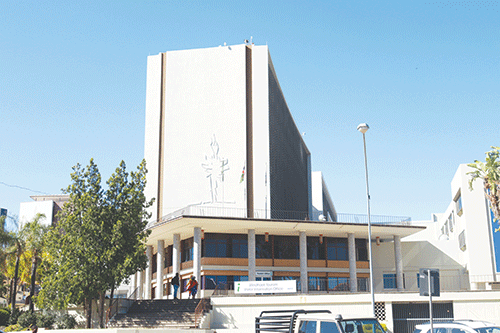Auditor General (AG) Junias Kandjeke gave the City of Windhoek a qualified audit opinion, but painted a precarious picture of its financial position, bringing its material existence into question.
In essence, the City of Windhoek (CoW) is broke. Kandjeke said in a 2020/2021 financial audit report tabled in parliament last week that the CoW does not have a plan on how it is going to turn around the commercial insolvency and the deficit-making position in the foreseeable future.
The report was compiled in September 2023.
“The financial statements present fairly, in all material respects, the financial position of the Municipality of Windhoek as at 30 June 2021, and its financial performance and its cash flows for the year then ended,” he states in the city’s audit report for the 2020/2021 financial year, justifying the qualified audit opinion.
A qualified audit opinion is expressed when the auditor either obtains sufficient appropriate audit evidence, and concludes that misstatements, individually or in the aggregate, are material but not pervasive to the financial statements.
What is apparent, however, is the precarious financial position the City finds itself in.
If anything, they are between a rock and a hard place financially.
“There is a lack of proper accounting policy notes, and accounting treatment for the accounting of private-public partnership transactions.
Thus, auditors could not obtain sufficient appropriate audit evidence regarding the accounting for property, plant and equipment and loans payable related to private-public partnership arrangements,” Kandjeke said.
Consequently, auditors could not obtain sufficient appropriate evidence to satisfy themselves that the opening accumulated surplus and comparative figures in the current year’s statement of financial position, statement of financial performance, statement of changes in net assets, cash flow statement and notes to the financial statements for the year then ended are fairly presented.
“Furthermore, the auditors were also unable to determine whether any adjustments might have been found necessary in respect of recorded or unrecorded opening balances for the relevant financial statement areas in the statement of financial position, statement of financial performance, statement of changes in net assets, cash flow statement and notes of the annual financial statements,” he added.
What is more, the biggest local authority in the land failed to provide, separately, an identifiable fund asset for the housing fund amounting to N$206.4 million.
“The housing fund balance at year-end of N$252.7 million [2020: N$206 362 649] includes an amount of N$182 485 071 [2020: N$206 362 649] that is not identifiably to classes of assets for the fund. Thus, the auditors could not obtain sufficient appropriate audit evidence regarding the accounting for the housing fund and the related fund assets,” Kandjeke found.
Furthermore, revenue of N$90.24 million and cost of sales of N$73.1 million were not separately disclosed in the statement of financial performance.
“This resulted in a profit on sale of land of N$17.14 million erroneously being disclosed in the statement of financial performance. By nature, these sales should be disclosed separately in proper categories,” he continued poking holes.
It gets even worse.
As of 30 June 2021, the municipality’s current liabilities of N$1.9 billion exceeded its current assets of N$942.56 million.
The municipality also incurred a deficit of N$482.25 million in 2020.
“These conditions indicate the existence of material uncertainties, which may cast significant doubt on the municipality’s ability to settle its obligations and/or maintain the sustainability of the current service delivery level in the normal course of business for the foreseeable future,” the AG stated.
In 2022, Independent Patriots for Change (IPC) Windhoek municipal councillor Jürgen Hecht painted a bleak picture of the municipality, one of a city in financial distress, with barely any room to manoeuvre.
“No commercial enterprise would have survived such amounts of losses, and would have been declared bankrupt within two to three years…this means the City of Windhoek cannot settle its current expenses and liabilities by means of its cash resources and outstanding debtors,” Hecht emphasised at the time.
The municipality was sitting with a cumulative loss of N$3.2 billion between 2012 and 2022, a N$300 million wage bill, N$100 million annual employee vehicle scheme, N$70 million losses on bus services, and a lifelong post-retirement medical aid scheme for which it spends N$27 million a year. The latter amount was described as a growing liability, as it depends on the number of employees who go on retirement.
“The City of Windhoek is a Titanic which has hit the bottom of the ocean, its present only lifeline being its N$200 million overdraft facility with FNB Namibia,” Hecht stated.
“It will take very ingenious and committed financial engineering, along with some ruthless decisions, to get this ship raised from the sea bottom to independently start sailing the wide-open ocean again”, he added ruefully.
-emumbuu@nepc.com.na


